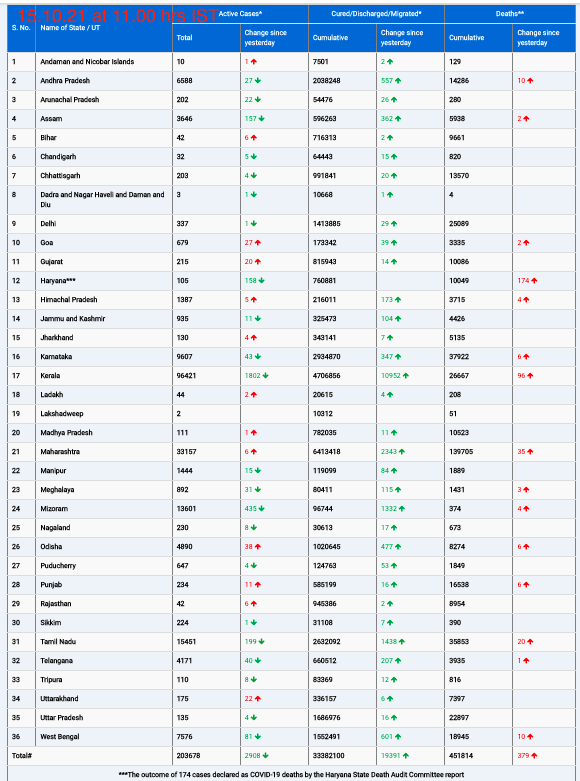In 2021 (till 21.11.21), a total number of 1,64,103 cases have been reported due to Dengue in the country, as against 2,05,243 in 2019. The Case Fatality Rate has been sustained at <1% since 2008. It has further come down below 0.2% in 2018 and 0.1% in 2019, which has been maintained at this level since then. Accordingly, it cannot be said that the Dengue cases are rising in the country.
The National Center for Vector-Borne Diseases Control (NCVBDC) administers the National Vector Borne Diseases Control Programme (NVBDCP) for prevention and control of six vector-borne diseases i.e., Malaria, Kala-azar, Lymphatic Filariasis, Dengue, Chikungunya & Japanese Encephalitis. The programme guidelines/action plans for Dengue & other Vector-Borne Diseases have been developed in consultation with Public Health Experts and States/UTs.
The government of India has taken the following measures for the prevention and control of dengue in the country:
-
- Provided Technical Guidelines for prevention and control, case management & effective community participation to the States for implementation. 15 advisories were issued from time to time to States/UTs for prevention and control of dengue in2021.
- Free diagnostic facilities through 713 Sentinel Surveillance Hospitals and 17 Apex Referral laboratories identified across the country are fully functional. 7.26 Lakh IgM tests have been provided by the Government of India. Additional funds have been provided to states for the procurement of NS1 kits for early diagnosis.
- Under National Health Mission, necessary and sufficient budgetary support is provided to states/UTs for dengue control activities i.e., dengue case management, vector control activities (provision of domestic breeding checkers, insecticide, fogging machines etc), training support, awareness activities,etc.
As far as Non-Communicable Diseases are concerned, The Department of Health & Family Welfare provides technical and financial support to the States/UTs under the National Programme for Prevention and Control of Cancer, Diabetes, Cardiovascular Diseases and Stroke (NPCDCS), as part of the National Health Mission (NHM), based upon the proposals received from the States/UTs and subject to the resource envelope. The Programme focuses on strengthening infrastructure, human resource development, health promotion & awareness generation for prevention, early diagnosis, management and referral to an appropriate level of health care facility for treatment of Non-communicable diseases.
A population-based initiative for prevention, control and screening of common, Non– Communicable Diseases (NCDs) i.e. diabetes, hypertension and common cancers have been rolled out in the country under NHM and also as a part of Comprehensive Primary Health Care. Under the initiative, persons more than 30 years of age are targeted for their screening. Screening of these common NCDs is also an integral part of service delivery under Ayushman Bharat Health and Wellness Centres.
The preventive aspect of NCDs has been strengthened under Comprehensive Primary Health Care through the Ayushman Bharat Health Wellness Centre scheme, by promotion of wellness activities and targeted communication at the community level. Other initiatives for increasing public awareness about NCDs and for promotion of healthy lifestyle includes observation of National and International Day and use of print, electronic and social media for continued community awareness. Furthermore, healthy eating is also promoted through FSSAI. Fit India movement isbeing implemented by Ministry of Youth Affairs and Sports, and various Yoga related activities are being carried out by Ministry of AYUSH. In addition, NPCDCS gives financial support under NHM for awareness generation (IEC) activities to be undertaken by the States/UTs as per their Programme implementation plans(PIPs).
National Multi-sectoral Action Plan (NMAP) for prevention and control of NCDs has been developed through series of consultations with various stakeholders including other Ministries/Departments. The action plan has identified action points for 39 Ministries/Departments.
The meetings have been conducted regularly involving public health experts from national level, United Nations Organizations and Non-Governmental Organizations.
Several committees involving public health experts from the National level, medical colleges, UN organizations etc. have been constituted and regular meetings have been conducted to improve the implementation of the NPCDCS programme.
The Union Minister of State for Health and Family Welfare, Dr Bharati Pravin Pawar stated this in a written reply in the Lok Sabha.












